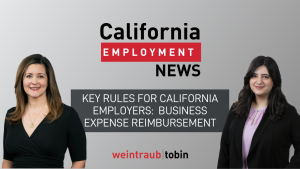Podcast: Play in new window | Download
 Are you reimbursing employees for business expenses? Weintraub attorneys Meagan Bainbridge and Nikki Mahmoudi discuss key reimbursement policies under California law, including cell phone use and mileage for business travel in this episode of California Employment News.
Are you reimbursing employees for business expenses? Weintraub attorneys Meagan Bainbridge and Nikki Mahmoudi discuss key reimbursement policies under California law, including cell phone use and mileage for business travel in this episode of California Employment News.
Watch this episode on the Weintraub YouTube channel.
Show Notes:
Meagan:
Hello, everyone. Thank you for joining us for this installment of California Employment News, an informative video and podcast resource offered by the Labor and Employment Group at Weintraub Tobin. My name is Meagan Bainbridge, and I’m a shareholder in the firm’s Labor and Employment Group. Today, I’m joined by my colleague, Nikki, and we’re discussing reimbursement of business expenses, particularly cell phone reimbursement and business travel mileage. So, Nikki, why don’t you start us off?
Nikki:
Of course. So Under Labor Code Section 2802, employers must reimburse employees for all necessary expenses and/or losses incurred in the course and scope of their employment. Now, this requirement is interpreted quite broadly by the courts because California law and public policy favor protecting employees from employers passing on operating costs onto those employees. Two of the biggest areas involving business reimbursement are cell phone reimbursement and gas mileage. When it comes to cell phone reimbursement, an employer must reimburse an employee if the employee is required to use a personal cell phone to make work-related calls. This is the case even when an employee is technically not incurring an extra expense by making those work calls because, let’s say, they have an unlimited data plan. Courts have found that the employer must pay some reasonable percentage of that cell phone bill to comply with the labor code, but there’s not a whole lot of guidance on what that necessarily means. We can say that where the employee is paying a fixed amount for their cell phone use, the employer must reimburse the employee for the percentage of the cell phone bill that can be attributed to the employee’s mandatory use of the cell phone for work-related purposes.
Meagan, could you tell us a bit about reimbursing employees for mileage? Of course.
Meagan:
The requirement to reimburse employees includes all work-related travel and mileage when an employee uses their personal car for work-related business. Of course, if they rent a car or travel by plane or train, that’s also reimbursed for the cost. But here, we’re focusing on when the personal car is used. Note, travel from home to work is usually not compensable, but most other travel time will be considered work time, and employees should be reimbursed for both, of course, their time that is spent in the car, but also for the mileage that is used. The IRS rate, which we’ve listed in the link below, is considered the most reasonable reimbursement rate by California state agencies. Currently, the rate in for self-employed and business use is 67 cents per mile. Of course, employers may reimburse employees for mileage at or below the IRS rate as long as the chosen rate covers all actual expenses incurred, both the mileage itself and for gas and the wear and tear on the vehicle. What you may want to keep in mind if you’re using anything beyond the IRS rate is that anything beyond it might be taxable as wages if the chosen rate exceeds actual expenses.
Similarly, if an employer uses a lower mileage rate than the IRS debate, then the employer must show that that rate sufficiently reimburses its employees for all their actual expenses. Utilizing the IRS’s rate, which is presumed to be reasonable, can make an employer’s life just a bit easier rather than having to calculate the actual expenses incurred by the employee.
Nikki:
Thank you, Meagan. That’s it for now. As a note, this is not meant to be an all-inclusive list of what an employer must reimburse an employee for. As we mentioned at the beginning of this video, employers must reimburse employees for all necessary expenses and/or losses incurred in the course and scope of their employment. Mileage and cell phone reimbursement are just the two biggest ones we see. Thanks for joining us on this episode of California Employment News. You can continue to find our video series and podcast through the lelawblog.com or on the Weintraub Tobin YouTube channel. We look forward to reconnecting with you on our next episode. Thank you.